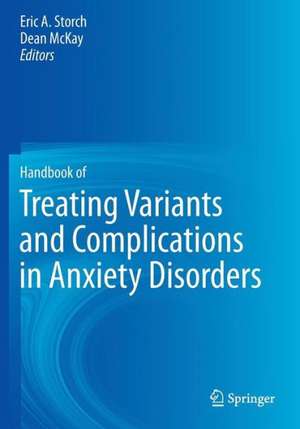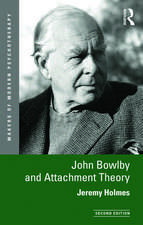Handbook of Treating Variants and Complications in Anxiety Disorders
Editat de Eric A. Storch, Dean McKayen Limba Engleză Paperback – 11 sep 2014
The Handbook of Treating Variants and Complications in Anxiety Disorders explains in clear detail how and why clinical factors present challenges to clinicians treating clients with these disorders. Comorbid conditions often found in children, adolescents, and adults with anxiety, including developmental disabilities and personality disorders, are analyzed in the context of treatment. Case examples and literature reviews illustrate the relative merits of integrated versus sequential treatment, the importance of prioritizing behaviors, age-related considerations, and therapist issues. This best-practices approach guides readers in choosing current evidence-based options for treatment that is tailored to the individual and effective in the short and long term. Included in the Handbook:
- Prognostic indicators of treatment response for children and adults with anxiety disorders.
- Treatment of comorbid anxiety and disruptive behavior in youth.
- Treatment of PTSD with comorbid borderline personality disorder.
- Limited motivation, patient-therapist mismatch, and the therapeutic alliance.
- Assessment and treatment of comorbid anorexia nervosa and obsessive compulsive disorder.
- Treatment of comorbid anxiety disorders across the lifespan.
| Toate formatele și edițiile | Preț | Express |
|---|---|---|
| Paperback (1) | 1542.79 lei 6-8 săpt. | |
| Springer – 11 sep 2014 | 1542.79 lei 6-8 săpt. | |
| Hardback (1) | 2119.39 lei 6-8 săpt. | |
| Springer – 22 mar 2013 | 2119.39 lei 6-8 săpt. |
Preț: 1542.79 lei
Preț vechi: 1623.98 lei
-5% Nou
Puncte Express: 2314
Preț estimativ în valută:
295.31€ • 320.88$ • 248.22£
295.31€ • 320.88$ • 248.22£
Carte tipărită la comandă
Livrare economică 21 aprilie-05 mai
Preluare comenzi: 021 569.72.76
Specificații
ISBN-13: 9781493921669
ISBN-10: 1493921665
Pagini: 432
Ilustrații: XV, 413 p. 6 illus.
Dimensiuni: 178 x 254 x 27 mm
Greutate: 0.74 kg
Ediția:2013
Editura: Springer
Colecția Springer
Locul publicării:New York, NY, United States
ISBN-10: 1493921665
Pagini: 432
Ilustrații: XV, 413 p. 6 illus.
Dimensiuni: 178 x 254 x 27 mm
Greutate: 0.74 kg
Ediția:2013
Editura: Springer
Colecția Springer
Locul publicării:New York, NY, United States
Public țintă
Professional/practitionerCuprins
Section I: Overview of Complexities in Anxiety Disorders.- Chapter 1: Nature and Etiological Models of Anxiety Disorders.- Chapter 2: Prognostic Indicators of Treatment Response for Adults with Anxiety.- Chapter 3: Prognostic Indicators of Treatment Response for Children with Anxiety Disorders.- Chapter 4: Continuing to Advance Empirically-Supported Treatments: Factors in Empirically-Supported Practice for Anxiety Disorders.- Section II: Complexities in Childhood and Adolescent Anxiety Disorders.- Chapter 5: Treatment of Childhood Anxiety in Autism Spectrum Disorders.- Chapter 6: Treatment of Comorbid Anxiety and Disruptive Behavior in Youth.- Chapter 7: Diagnosis and Cognitive Behavioral Treatment of Anxiety Disorders in Young Children.- Chapter 8: Treating Obsessive-Compulsive Disorder in the Very Young Child.- Chapter 9: Treatment of Childhood Tic Disorders with Comorbid OCD.- Chapter 10: Treatment of Childhood Anxiety in the Context of Limited Cognitive Functioning.- Chapter 11: Special Considerations in Treating Anxiety Disorders in Adolescents.- Chapter 12: Social Anxiety and Socialization Among Adolescents.- Chapter 13: PANDAS: Immune Related OCD.- Section III: Complexities in Adult Anxiety Disorders.- Chapter 14: Treatment of Posttraumatic Stress Disorder with Comorbid Borderline Personality Disorder: Integrating Dialectical Behavior Therapy and Prolonged Exposure.- Chapter 15: Treatment of Anxiety and Comorbid Cluster A Personality Disorders.- Chapter 16: Treatment of Comorbid Depression.- Chapter 17: Limited Motivation, Patient-Therapist Mismatch, and the Therapeutic Alliance.- Chapter 18: Substance Abuse and Anxiety Disorders: The Case of Social Anxiety Disorder and PTSD.- Section IV: Cross Developmental Complexities.- Chapter 19: Treatment of Comorbid Anxiety Disorders across the Lifespan.- Chapter 20: Family Conflict and Childhood Anxiety.- Chapter 21: Assessment and Treatment of Comorbid Anorexia Nervosa and Obsessive Compulsive Disorder.- Chapter 22: Cluster C Personality Disorders and Anxiety Disorders.- Chapter 23: Therapist Barriers to the Dissemination of Exposure Therapy.- Chapter 24: Harnessing the Web: Internet and Self-Help Therapy for People with Obsessive-Compulsive Disorder and Post-Traumatic Stress Disorder.- Chapter 25: Where Do We Go From Here? How Addressing Clinical Complexities Will Result in Improved Therapeutic Outcomes.
Notă biografică
Eric A. Storch, Ph.D., is Professor and All Children’s Hospital Guild Endowed Chair in the Departments of Pediatrics and Psychiatry & Behavioral Neurosciences, University of South Florida. He holds a joint appointment in the Department of Psychology. He is Associate Editor for three journals: Child Psychiatry and Human Development, Journal of Cognitive Psychotherapy, and Journal of Obsessive-Compulsive and Related Disorders, and serves on the editorial boards of Journal of Clinical Child and Adolescent Psychology, Journal of Child Health Care, Psicologia Conductual, and Journal of Anxiety Disorders. He has published more than 300 peer-reviewed journal articles and book chapters and has given more than 250 conference presentations. In addition to his peer-reviewed articles, Dr. Storch has edited or co-edited three books dealing with treatment of complex cases in children, obsessive-compulsive disorder, and childhood anxiety. He has received grant funding for his work in OCD, related disorders (e.g., tics), and anxiety from the National Institutes of Health, Agency for Health Care Research and Quality, CDC, International OCD Foundation, Florida Department of Health, pharmaceutical companies, Tourette Syndrome Association, and National Alliance for Research on Schizophrenia and Affective Disorders (NARSAD). In addition to treatment outcome, Dr. Storch has specific research interests in treatment augmentation and dissemination. He directs the the University of South Florida Obsessive-Compulsive Disorder Program and is highly regarded for his treatment of pediatric and adult OCD patients.
Dean McKay, Ph.D., ABPP, is Professor, Department of Psychology, Fordham University. He currently serves on the editorial boards of Behaviour Research and Therapy, Behavior Modification, Behavior Therapy, and Journal of Anxiety Disorders and is Editor-in-Chief of Journal of Cognitive Psychotherapy. Dr. McKay is President-elect of the Association for Behavioral and Cognitive Therapies (Presidential term 2013-2014). He has published more than 130 journal articles and book chapters and has more than 150 conference presentations. He is Board Certified in Behavioral and Clinical Psychology of the American Board of Professional Psychology (ABPP), and is a Fellow of the American Board of Behavioral Psychology and the Academy of Clinical Psychology. He is also a Fellow the American Psychological Society. Dr. McKay has edited or co-edited eight books dealing with treatment of complex cases in children and adults, obsessive-compulsive disorder, disgust in psychopathology, and research methodology. His research has focused primarily on Obsessive-Compulsive Disorder (OCD), Body Dysmorphic Disorder, and Hypochondriasis and their link to OCD as well as the role of disgust in psychopathology. His research has also focused on mechanisms of information processing bias for anxiety states. Dr. McKay is also director and founder of Institute for Cognitive Behavior Therapy and Research, a private treatment and research center in Westchester County, New York.
Dean McKay, Ph.D., ABPP, is Professor, Department of Psychology, Fordham University. He currently serves on the editorial boards of Behaviour Research and Therapy, Behavior Modification, Behavior Therapy, and Journal of Anxiety Disorders and is Editor-in-Chief of Journal of Cognitive Psychotherapy. Dr. McKay is President-elect of the Association for Behavioral and Cognitive Therapies (Presidential term 2013-2014). He has published more than 130 journal articles and book chapters and has more than 150 conference presentations. He is Board Certified in Behavioral and Clinical Psychology of the American Board of Professional Psychology (ABPP), and is a Fellow of the American Board of Behavioral Psychology and the Academy of Clinical Psychology. He is also a Fellow the American Psychological Society. Dr. McKay has edited or co-edited eight books dealing with treatment of complex cases in children and adults, obsessive-compulsive disorder, disgust in psychopathology, and research methodology. His research has focused primarily on Obsessive-Compulsive Disorder (OCD), Body Dysmorphic Disorder, and Hypochondriasis and their link to OCD as well as the role of disgust in psychopathology. His research has also focused on mechanisms of information processing bias for anxiety states. Dr. McKay is also director and founder of Institute for Cognitive Behavior Therapy and Research, a private treatment and research center in Westchester County, New York.
Textul de pe ultima copertă
As prevalent as anxiety is as a diagnosis, clinically complex cases are even more so. At the same time that it is recognized as a spectrum of disorders with many possibilities for intervention, it is most often seen with variations that further complicate treatment. The Handbook of Treating Variants and Complications in Anxiety Disorders explains in clear detail how and why clinical factors present challenges to clinicians treating clients with these disorders. Comorbid conditions often found in children, adolescents, and adults with anxiety, including developmental disabilities and personality disorders, are analyzed in the context of treatment. Case examples and literature reviews illustrate the relative merits of integrated versus sequential treatment, the importance of prioritizing behaviors, age-related considerations, and therapist issues.
This best-practices approach guides readers in choosing current evidence-based options for treatment that is tailored to the individual and effective in the short and long term. Key topics addressed in the Handbook include:
This best-practices approach guides readers in choosing current evidence-based options for treatment that is tailored to the individual and effective in the short and long term. Key topics addressed in the Handbook include:
- Prognostic indicators of treatment response for children and adults with anxiety disorders.
- Treatment of comorbid anxiety and disruptive behavior in youth.
- Treatment of PTSD with comorbid borderline personality disorder.
- Limited motivation, patient-therapist mismatch, and the therapeutic alliance.
- Assessment and treatment of comorbid anorexia nervosa and obsessive compulsive disorder.
- Treatment of comorbid anxiety disorders across the lifespan.
Caracteristici
Examines unique factors that may differentially impact children and adults with anxiety
Focuses on tailoring treatment to the individual, consistent with the NIH roadmap initiative
Discusses treatment strategies for youth with ASD and co-occurring anxiety
Pragmatic, clinical focus provides a how-to guide for dealing with common issues that may complicate treatment
Includes supplementary material: sn.pub/extras
Focuses on tailoring treatment to the individual, consistent with the NIH roadmap initiative
Discusses treatment strategies for youth with ASD and co-occurring anxiety
Pragmatic, clinical focus provides a how-to guide for dealing with common issues that may complicate treatment
Includes supplementary material: sn.pub/extras












